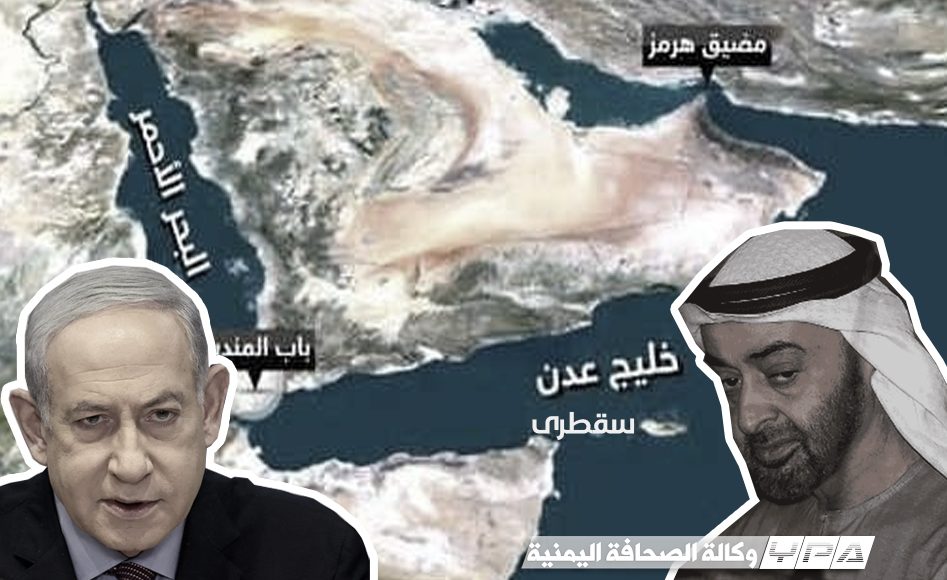WASHINGTONG, Nov. 15 (YPA) -The American research institute, the Arab Center Washington D.C., has revealed a recent surge in “Israeli” interest in the UAE-backed forces in Yemen, specifically the Southern Transitional Council (STC) and the forces led by Tariq Saleh. The institute sheds light on the Zionist coalition’s policy, facilitated through the UAE, involving cooperation with pro-Coalition Yemeni factions.
The Center published a report written by Giorgio Cafiero, CEO of Gulf State Analytics, last Friday, confirming the increasing interest of the UAE-affiliated Southern Transitional Council (STC) in establishing a relationship with “Israel,” securing its interests, and pledging to join the so-called “Abraham Accords.” This was evidenced by statements from the STC President, Aidarous Al-Zubaidi, during the UN General Assembly in September and earlier remarks stating, “When we have our southern state, we will make our own decisions, and I believe we will be part of these agreements.”
The report suggests that such statements and STC initiatives—particularly regarding “securing navigation” and confronting Sanaa forces—have attracted Washington and “Israel”, especially as they serve the STC’s secessionist ambitions in exchange for securing American and Israeli interests. The report notes that “Israel” views the STC’s position as a new development, particularly after the UAE’s normalization with the Zionist entity, which saw STC leader Hani Bin Breik welcoming the agreement with “Israel,” aligning the STC early with Abu Dhabi’s agenda.
It further detailed that in 2020, the UAE and “Israel” proceeded with plans to establish military and other facilities in the strategic Socotra Archipelago. Emirati aircraft transported dozens of Israeli officers and soldiers to Socotra nine months after normalization, specifically in February 2021. This was followed by a joint naval drill in the Red Sea involving US, UAE, Bahraini, and Israeli forces, marking the UAE’s first announced military cooperation with the Zionist entity.
The report’s author posits that cooperation with the UAE and the STC cemented the Israeli presence in Socotra, allowing them to monitor what they termed “Iranian maritime activities” across the Arabian Sea, Gulf of Aden, and Indian Ocean, particularly after the military operations launched by Sanaa-based Yemeni forces in support of Gaza since November 2023. This serves the Zionist entity’s strategic interest in southern Yemen via the STC to counter the “Houthis.”
The report indicated that the Israeli activities in Socotra align with a “pressure campaign pursued by the Trump administration to contain Iran and allied non-state actors across the Arab world, in addition to advancing the UAE’s goal of deepening its security partnership with Washington.”
It clarified that despite Yemeni opposition to any “Israeli” presence on their soil, the UAE-backed secessionist STC has emerged as the most “Israel-friendly” actor in Yemen. For the STC, cooperating with “Israel” is a means to advance its broader goal of securing “international legitimacy for an independent South Yemen state.” Aligning with “Israel” could enhance the STC’s standing with decision-makers in Washington, offering tangible benefits ranging from intelligence to diplomatic support. However, this relationship carries significant political risks domestically, including in the southern governorates where solidarity with Palestine and hostility toward “Israel” remain deeply rooted and widespread.
The report concluded that “the STC’s growing alliance with Israel serves multiple strategic purposes, enabling it to project an image of discipline, pragmatism, and security concern, unlike the hardline stance of Ansarallah and its Iran-aligned ideology of resisting America, Israel, and cooperating Gulf states.”
It anticipates increased Israeli support for UAE-affiliated groups in Yemen—the STC and Tariq Saleh’s “National Resistance” forces—and all opponents of the Sanaa government (“Houthis”), driven by the growing strategic importance of UAE-Israeli cooperation in and around the Bab al-Mandab in maritime strategies.
The report added that the essence of the STC’s openness to cooperation with “Israel” is bolstered by reports of quiet intelligence coordination between “Israel” and the UAE, which considers the STC (a body it created in mid-May 2017) its partner. The UAE’s efforts to involve the STC in a relationship with “Israel” are seen as an opportunity to secure American and Israeli support for its tools in southern Yemen, progressing toward normalization to achieve clear military objectives in the Gulf of Aden, Bab al-Mandab, and the Southern Red Sea, catalyzed by growing Israeli cooperation towards these goals since past years, based on the initiative known as “Crystal Ball.”
It warns that the pro-Israeli stance of the STC and UAE-backed forces in southern Yemen carries significant local and regional risks, given the strong anti-Israeli sentiments, existing Yemeni solidarity with Palestine, and the opposition of Yemeni political parties and armed factions in Sanaa, all of which continue to question the legitimacy of the “Presidential Leadership Council.” The report stresses that direct Israeli-Emirati intervention at this stage could exacerbate tensions in the Red Sea, Gulf of Aden, and Bab al-Mandab.
YPA


